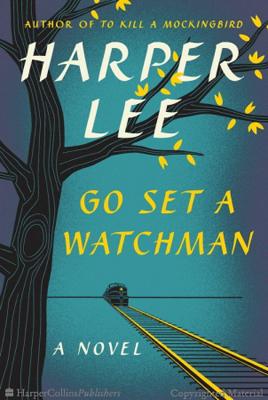Go Set a Watchman
- 28 Jul 2015
- Two weeks have passed since the highly anticipated release of the follow-up to Harper Lee's masterpiece. This sequel is disappointing, but I can appreciate it as a reflection of the real world.

I’ve already written about my love for To Kill a Mockingbird and my excitement for Go Set a Watchman. I bought the 50th Anniversary Edition of the former, five years ago, and I bought the Amazon Kindle version of the latter, several hours before its midnight release. I considered buying The Harper Lee Collection, but I wasn’t sure that I would like the story of the newer half in this hardcover collection.
I skimmed through the first third of Watchman. I read it here and there, in situations that one might read a digital book with a smartphone for several minutes at a time. I was bored, but I set aside several hours and read the rest of it within two days of release. Besides mentions of Jem being long dead and Dill being in Italy, there isn’t anything memorable. The presence of Henry is an interesting addition to the world of Jean Louise aka Scout, though.
More like, Now Overcome a Disappointment
Mockingbird delays its core story, the trial of Tom Robinson, but the build-up is not only enjoyable, it’s effective, too. Like Scout and the others, the reader is focused on their childhood activities, blissfully unaware of the epic struggle that looms on the horizon. I was expecting the same thing to happen in Watchman, especially once I read to the point of Jean Louise finding racist propaganda in Atticus’s reading area.
Would the increasingly feeble Atticus heroically lead a campaign for racial equality, or at least racial tolerance, in a period that was historically filled with civil unrest? No. Instead, Jean Louise spies on Atticus and Henry as they take part in a council meeting of men, all white and almost all known to her, who are opposed to government-mandated racial desegregation among other things.
For Jean Louise, Atticus’s and Henry’s association with such men literally makes her sick. The revelation of Atticus being, at the very least, in favor of exclusive voting rights is world-shattering to Jean Louise and to Mockingbird fans who have idolized this fictional man. Jean Louise individually confronts Aunt Alexandra, Uncle Jack, Henry, and of course Atticus, dismissing most of their explanations.
The climax is a relatively uneventful conversation between father and daughter. Despite her prior outburst, Atticus is proud of Jean Louise for her independent views and passion for them. Finally accepting that he is imperfect, Jean Louise forgives Atticus. There are a couple of flashbacks to Jean Louise’s early adolescence and a couple of visits to past friends, as well as details about the deaths of Jem and their mother, but Watchman doesn’t have much else.
The title is a reference to a Bible passage that Uncle Jack later explains: it’s a proverb about the conscience that Jean Louise, or anyone else for that matter, needs to establish for herself. The proverbial watchman that Jean Louise has in her mind puts her into conflict against her loved ones, especially Atticus. As high-art and real-life reflect each other, Mockingbird lovers are reacting the same way that Jean Louise does in Watchman.
In Defense of Atticus
Like other people, I look up to Atticus in Mockingbird as a literary paragon of civility and courage. I’m disappointed that his views on civil rights in the South are on the wrong side of history. However, I’m not going to immediately condemn the character, the book, or the author.
I understand Atticus’s explanation for not wanting the blacks in Maycomb County and the surrounding area to vote in local elections; because of their strength in numbers, they would vote unqualified members of their sub-community into positions of office. Even Jean Louise concedes that their black populace is “backward.” Unless I’ve misread things, Atticus’s opposition is based on local and immediate concerns.
Does Atticus believe that all black people are inherently unworthy of learning, voting, and leading in public institutions? I’ve never had that impression while reading Watchman. Scout learns that Atticus had actually been a member of the Klu Klux Klan, but he later explains that his motivation had been to know the identities of the local men behind the masks. Atticus is motivated by calculation even when arguably being a bigot.
Jean Louise, on the other hand, is fuelled with emotion. At one point, she is practically ready to disown Atticus, but Uncle Jack later makes the argument that she is, in a way, the worst bigot of all: she’s unwilling to look beyond a flaw, perceived or real, in her father and won’t “crawl into his skin and walk around in it.” As for Atticus, I think that his stance is “not now” instead of “not ever.” It doesn’t undo his valiant effort to defend Tom Robison.
Thug Notes has another interesting and irreverent summary.
Watchman was written close to 60 years ago, before its famous prequel was published. The topic of black-white relations in the US is still relevant today, mostly for sad reasons. It’s not destined to be required-reading in high-school English classes everywhere, at least not without being paired with Mockingbird. Nonetheless, this book is worth reading, if only to catch up with the grown (and still growing) Scout.
This book is disappointing compared to the greatness of its precursor, but if the two other rumored Harper Lee books do exist and are published, I would buy them if they take place in the world of the Finches.